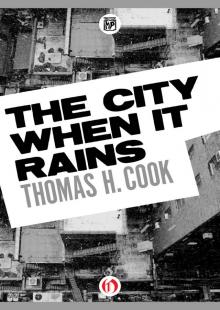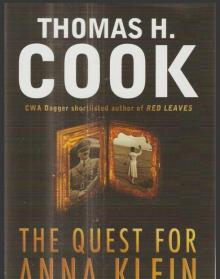- Home
- Thomas H. Cook
Peril Page 16
Peril Read online
Page 16
But what made her different?
The answer came so quickly, he knew that it was true.
What made her different?
A courage so raw, he could almost see it bleed.
He didn’t know what was eating at her, whether it was real or something inside her head. He knew only that she was trying desperately to stay ahead of it, and that you had to have guts to run that long and hard, always alert for the sound of footsteps behind you, always glancing over your shoulder. He didn’t know how long she’d have to live this way. He knew only that it was part of the package, something you signed on for if you signed on for her.
And that’s what he’d done, he knew, he’d signed on. But for what exactly? He shook his head at his helplessness. If it were a movie, he’d know what to do. If it were a guy bothering her, he’d be like Gary Cooper or somebody like that. Man of the West, that was the movie he thought of. He’d be like Gary Cooper in Man of the West. The problem was that in the movies it always ended with that final showdown. No cops came around later to investigate. No guys in lab coats examining fibers. No grand jury mulling it over. No fourteen-page indictment, no lengthy trial, no heart-stopping conviction . . . no consequences at all. In the movies, a bad guy was dead, and, quite rightly, nobody gave a fuck.
The door opened and he saw Mortimer’s face hanging like a funeral wreath in the air.
“Hey, Abe,” he said.
“Mort,” Abe answered dully, his mind still on Samantha, how at sea he was.
Mortimer took off his hat and flopped it down on one of the stools while he slid up on the one beside it.
Abe poured him a drink.
“Thanks,” Mortimer said. He knocked back the scotch, wiped his mouth with the sleeve of his jacket. “So, what’s new?”
“Not much,” Abe said. He’d meant to say nothing more, but suddenly he thought of Samantha again, and despite the fact that Mortimer was hardly the guy he’d normally have talked to about anything important, he said, “I met this woman.”
Mortimer seemed delighted not by what Abe had said, the fact that he’d met a woman, but simply that Abe had mentioned it to him. “No kidding,” he said. He idly circled the rim of his glass with a single finger. “Good for you.” His finger abruptly stopped its circuit and he looked at Abe like a guy who wanted to give good advice. “ ’Cause we ain’t got long, you know?”
Abe wiped the bar with a white cloth. “No, we don’t.”
Mortimer glanced away, his eyes now fixed on the front window, the gray, cascading rain. “So don’t let this one get away,” he said.
“I may have to,” Abe said.
“Why’s that?”
Abe realized that he didn’t know Mortimer Dodge nearly well enough to be talking to him this way. He laughed. “Ah, nothing. She doesn’t talk about it, but, I don’t know, it’s got me thinking maybe I should start packing a gun.”
“A gun?” Mortimer asked. “What for?”
Abe waved his hand, now sorry that he’d brought it up, since the whole thing had finally sunk into nothing more substantial than a cowboy movie fantasy. “In case some guy’s bothering her, which maybe there is and maybe there isn’t.”
“More like a chance of it,” Mortimer said thoughtfully. “Like it could be a guy.”
“Yeah.”
Mortimer nodded. “So, you got a gun, Abe?”
Abe laughed. “Of course not,” he said. He poured Mortimer another drink. “So, what’s new with you, Morty?”
“Same,” he said without emphasis.
“Nothing new on your . . . condition?”
“I’m a dead man,” Mortimer said. “So what?”
“So what?” Abe asked.
Mortimer looked at him without expression. “It ain’t like I got much to lose.”
“It’s harder, I guess,” Abe said, thinking of Samantha again. “It’s harder when you do.”
EDDIE
He blew into his cupped hands, then rubbed them together rapidly. It was nearly two thirty-four in the morning, and he’d decided that if the man in the black suit did not come out again before three A.M., he’d leave. On the other hand, if he reemerged from the building, Eddie would fall in behind him, follow him wherever he went, wait until he came out again, resume the tail.
It was boring labor, especially in the spitting rain that had now begun to fall. It was cold and dark and boring, but that was the price of real friendship, Eddie decided. Helping Tony was something he had to do because he could not imagine doing otherwise. He remembered the day the Towers fell, how his cousin Tommy had survived the collapse, called his wife, Celia, and told her he was okay. She’d begged him to come home, crying all the time they were on the phone together. But Tommy had said no, that there were other firemen buried in the rubble, that he had to stay. Celia had kept crying, and Tommy had finally just hung up on her. It was a little like that, Eddie concluded, this thing he had to do for Tony. Not as terrible as the thing Tommy had gone through, but one of those moments when there really wasn’t a right thing to do, so you just did the thing that seemed less wrong.
A blast of wind struck him, shaking raindrops from the tree above him in a splattering shower. He brushed the shoulders of his old blue jacket, then pulled off his cap and slapped it against the side of his leg. When he returned it to his head, the man in the black suit was already coming down the stairs.
He eased himself behind the tree but saw that it was too late. The man had already caught him in his eye. But so what, Eddie thought. He was just some guy on the street, no one likely to be noticed. And yet the man seemed to notice him, and as Eddie watched, he glanced left and right down the street as if checking to see if anyone else was around, then stepped off the curb and made his way across the street, walking slowly, deliberately, until he made it to the other side, where he stopped, his body in profile under the streetlamp.
He was only a few feet away now, and Eddie could make out the gaunt face, the shimmering white hair. He looked like a guy in the movies, an aging film star, the Cary Grant type, but with a silent, sinister edge. For a moment he stood very still, his hands thrust deep into the pockets of the black overcoat, his collar turned up against the wind and the rain. He seemed to be looking at the brick wall that faced him, staring at it intently, as if reading instructions that only he could see. Then he turned, his face now in full view, so that Eddie could see the curious sadness that wreathed it and gave it the lost, hopeless look of a man who didn’t like the things he had to do.
“It’s over,” the man said.
The words had come so suddenly and with such finality, Eddie wondered if they’d actually been meant for him at all.
“What?” he asked.
The man took two broad steps with a quickness and agility that made it seem as if he’d been blown across the pavement by a sudden gust of wind. “It’s over.”
Eddie stared into the unblinking eyes. “What is?” he asked.
“All your plans,” the man said.
“I don’t know what you—”
He felt the man’s hand at the collar of his jacket, then the sharp bit of a blade at his throat.
“Don’t say a word,” the man said.
Eddie wanted to speak but could think of nothing to say, and so simply obeyed helplessly.
“Now,” the man said. “Come with me.”
FOUR
For All We Know
STARK
To his surprise, he’d stayed the night, something he’d never done before, and which told him that new arrangements were being made, preparations for the moment, that something deep inside him had pronounced the last rites.
“You want to have breakfast?” she asked tentatively.
He shook his head. “I have an appointment.”
It was the only answer he’d ever given, but on this morning, with her eyes upon him so oddly, as if studying some previously unnoticed feature of his face, he felt a curious impulse to say more. “I don’t mean to be so aloof,�
� he said.
She laughed. “Aloof doesn’t begin to describe you, Stark.”
Her name was Kiko, and she was the only lover who’d lasted. And yet, even with Kiko, he’d maintained his usual distance. She called him when she had a free afternoon, which happened about once a month. They met at her apartment on the Upper East Side, a place that was always immaculately clean and smelled faintly of lavender. The bedroom was small but beautifully appointed, with Kiko’s own small paintings on the pale blue walls, flower gardens that had a vaguely sensuous feel to them, though in a chilly, refrigerated sort of way. Amid these motionless blooms they “did” each other, as Kiko liked to call it, then went their separate ways.
“My father’s pretty sick,” she said.
Stark had never met Kiko’s father, nor anyone else in her family, nor any of her friends. And so it surprised him when he said, “I hope he’ll be okay,” with an unmistakable sympathy.
“He won’t be,” she said.
“It’s like that?”
“Yes.”
He had no words for her, and so walked over to the bed, leaned forward, and kissed her softly.
She looked at him quizzically. “You’re in a strange mood.”
He stepped away and continued to dress.
She watched him somberly for a moment, then cocked her head to the right, almost playfully. “By the way, there’s something I’ve never asked you. Are Asians better? I hear guys think we are.”
He stood by the window, knotting his tie. Outside, a brief autumn rain had come to an end. “I don’t rank women by ethnic group,” he told her.
She propped herself up in the bed. Her hair lay thick as a blanket over her small and perfect breasts. She had flawless skin and gleaming oval eyes. Everything about her was perfect, particularly her forthright acceptance of herself, the utter lack of self-importance.
“Okay, so how do you rank them, Stark?” she asked.
“By how much I care,” he told her.
“You’re serious.”
“Yes.”
“So where am I on that list?”
“Second from the top.”
Something in her face changed. “We’ve been together for a long time.”
He gave his tie a final pull. “Yes, we have.”
“What’s our secret?”
“That we’re easy, I guess,” Stark answered. “That it’s no big deal.”
She drew her knees up and planted her chin on them. “That is so the wrong answer, Stark.”
He plucked his jacket from the chair across from the bed. “Maybe it’s time for you to move on, Kiko.”
She heard it, and he knew she’d heard it, the air of finality in his voice, its declaration, clear and ominous, that he’d turned a corner in his life, was taking no one with him.
“You’re not coming back, are you?” she asked.
He said nothing but only drew on his jacket and buttoned it.
“Can you at least tell me why?”
He walked to the door, then turned and faced her squarely. “Because you need to find someone else and go over the falls with him.”
“Over the falls.”
“You need to fall in love, Kiko,” Stark said. “Everybody needs to do that . . . just once.”
Her eyes glistened suddenly, and her long black hair trembled. “Good-bye, Stark,” she said.
At the door he wanted to look back but knew he shouldn’t. “Good luck” was all he said.
TONY
The little rooming house was neat but very shabby, with furniture that looked scavenged from the street. Eddie’s room was equally spare. A small refrigerator rattled in one corner. A single-eyed hot plate sat on a tiny wooden table, fit only for heating water or canned food.
“He ain’t suppose to have a hot plate,” the old woman who ran the place said sourly. “Fire code don’t allow it.”
Tony stood at the center of the room, hoping to get some idea of where Eddie had gone. He’d never been in Eddie’s room, he realized, nor anywhere else with him save at the marina or one of the little diners in the nearby village. And yet, during all that time, he’d thought of Eddie as his best friend, the person he’d turned to to help find Sara, and who had now vanished without a word.
“He didn’t come into work this morning,” Tony said. “Didn’t call. So I was wondering, you know, if maybe something happened.”
The old woman plopped down in the room’s single, overstuffed chair. Her hair was white and stringy, her eyes a filmy brown.
“He don’t talk much, Eddie,” she said. “Keeps to himself.”
Tony wondered if this amounted to loneliness, or if Eddie was simply one of those solitary souls who prefers the quiet, the lack of fuss, a life without strings.
“When was the last time you saw him?” he asked.
“Yesterday,” the old woman answered.
“What time?”
“In the morning. About nine, something like that.”
Tony glanced toward the open closet, where a few shirts hung limply from wire hangers, along with a couple of wool jackets and three pairs of flannel trousers. “It’s not like him not to show up for work, not to call in. It’s just not like him.”
“So, where is he, you think?” the old woman asked.
“I don’t know,” Tony answered. He walked to the window and peered out at the street. The neighborhood was like Eddie’s closet, drab and untended, its faded brick buildings lined up like old shoes. “Did you notice him going off with anybody?”
The old woman shook her head. “But I don’t keep an eye on the men who live here. And Eddie, I didn’t even know he was missing.”
And so no one would be hunting for Eddie Sullivan, Tony thought, no wife or kids or friends save for Tony himself.
“You think he’s in trouble some way?” the old woman asked.
Tony peered at the empty parking space where Eddie’s old Ford should have been parked. “I’m sure he’ll turn up.”
But he was not sure Eddie would turn up, and if he didn’t, he had no one but himself to blame. For a moment he reviewed the circumstances that had led to this pass. He’d asked Eddie to talk to Caruso, and after that Eddie had disappeared. And so it stood to reason that if anyone knew where Eddie was, it was probably Caruso. Even so, Tony didn’t know what to do about it. Caruso worked for his father, and the Old Man would be furious at the thought that Tony had tried to come between him and his trusted gofer.
He was still pondering the situation when he got back to the marina. He’d hoped to see Eddie’s beat-up old car in the lot, but it wasn’t there, and because of that Tony now felt a slowly deepening dread settle upon him.
He walked into his office, glanced out the window, hoping against hope that Eddie would miraculously appear, sauntering down one of the wooden piers in that ungainly way of his. But Eddie didn’t materialize, and so he turned from the window and sat down at his desk. For a time he once again considered his options. They seemed to grow fewer with each consideration, and finally he concluded that there was nothing to do but take the bull by the horns. He picked up the phone and dialed the number.
“Yeah?”
“Vinnie, it’s Tony Labriola.”
Silence.
“I’m calling about Eddie Sullivan.”
Silence.
“I thought you might know where he is.”
“Why would I know that?”
“Vinnie, this is serious.”
Silence.
“Are you listening, Vinnie?”
“Yeah, I’m listening.”
“I know he talked to you about Sara.”
Silence.
“About how my father’s looking for her.”
Silence.
“You hear me, Vinnie?”
“Yeah.”
“So, what did you tell him?”
“I didn’t tell him nothing.”
“Vinnie, are you listening to me? Eddie’s missing.”
Silence.
/> “Vinnie, I can’t let this go. I know Eddie talked to you about Sara. Now, listen, did you tell my father that Eddie talked to you?”
“No.”
“Tell me the truth, Vinnie.”
“I didn’t tell him nothing. Your father, I mean.”
“What did you tell Eddie?”
“Nothing.”
“Vinnie.”
“Nothing.”
“Where is he, Vinnie?”
“I don’t know.”
“Where is he, Vinnie?” Tony repeated evenly.
“I’m telling you, I don’t know,” Caruso answered.
“I know you talked to him.”
“Okay, so what? I ain’t saying I didn’t talk to him. But that don’t mean I know where he is. Last I seen him we was at Billy’s Grill. Like you say, he wanted to know was I looking for your wife. I told him no, and that was the end of it.”
Tony listened for something further at the other end of the line, a word or caught breath, some hint that signaled truth or lie, but nothing stirred, and so, after a moment, he said, “Vinnie, we got to meet.”
“That ain’t a good idea, Tony.”
“You got to meet me. I won’t say a word about it to my father, but I got to talk to you. We’ll go out on my boat. Nobody’ll see us. You got to do this, Vinnie. I got to find Eddie.”
“But I don’t know nothing about Eddie.”
“Vinnie, this thing is getting out of control.”
Silence.
“Come to the marina,” Tony said.
Caruso did not respond.
“Vinnie, if you don’t meet me, I got no choice but talk to the cops.”
“The cops? What they got to do with it?”
“Plenty if something happened to Eddie.”
“Nothing happened to Eddie.”
“How do you know?”
“I just know, that’s all. Eddie don’t never get in trouble.”
“So where is he, Vinnie?”
Silence.
“So, you gonna come to the marina or not?”
“Yeah, okay,” Vinnie said.

 The Interrogation
The Interrogation Sacrificial Ground
Sacrificial Ground The Fate of Katherine Carr
The Fate of Katherine Carr What's In A Name
What's In A Name Blood Innocents
Blood Innocents Peril
Peril A Dancer In the Dust
A Dancer In the Dust Breakheart Hill
Breakheart Hill The Chatham School Affair
The Chatham School Affair The City When It Rains
The City When It Rains Blood Echoes
Blood Echoes Mortal Memory
Mortal Memory Evidence of Blood
Evidence of Blood Into the Web
Into the Web The Crime of Julian Wells
The Crime of Julian Wells Blood Echoes: The Infamous Alday Mass Murder and Its Aftermath
Blood Echoes: The Infamous Alday Mass Murder and Its Aftermath Night Secrets
Night Secrets Places in the Dark
Places in the Dark The Orchids
The Orchids Elena
Elena Streets of Fire
Streets of Fire Instruments of Night
Instruments of Night Sacrificial Ground fc-1
Sacrificial Ground fc-1 The Quest for Anna Klein
The Quest for Anna Klein Sandrine's Case
Sandrine's Case Quest for Anna Klein, The
Quest for Anna Klein, The Fatherhood
Fatherhood Flesh and Blood
Flesh and Blood Red Leaves
Red Leaves